林语堂及翻译
2014 林语堂与_红楼梦_的翻译_李平

林 语 堂 与 ︽ 红 楼 梦 ︾ 的 翻 译
“性灵派 ” 在谈到 时, 林语堂认为林黛玉也属于该
“若是果有了奇句, 派, 因为她认为 连平仄虚实不对却使得 ” ( 《红楼梦》 的 第四十八回 ) ( When a poet has a good line, 291
never mind whether the musical tones of words fall in with the established pattern or not. ) ⑨。《生活的艺术 》 于 1937 年在 美国出版, 次年便居美国畅销书排行榜榜首达 52 周, 且接 连再版四十余次, 并为十余种文字所翻译。 经济上的宽裕 : “拟翻译五 让林语堂有精力重新考虑出国前的翻译计划
二 〇 一 四 年 第 四 辑 《红楼梦》 的重要译本, 都产生于二十世纪, 先后出现 三次翻译波。第一波出现在二十年代, 王良志译本于 1927 年在美国纽约出版, 王际真译本于 1929 年在英美出版。 第 二波出现在五十年代, 麦克休译本于 1957 年在纽约出版,
瑡 瑐 1958 年再版; 同时, 。 第三波 王际真的译本也刊出第二版
⑩ ” 六本中国中篇名著。
1937 年底, 于是, 林语堂应蓝登书屋 ( Random House ) 《孔子的智慧 》 ( The Wisdom of Confucius, 之约, 开始编译 林 ) 一书, 1938 年“正月间拼命将书 语堂自译为《孔子哲言 》
瑡 瑏 。该书出版后受到美国广大读者欢迎, 译完” 好评如潮。
《红楼梦》 再看看其他几个 译者的译文: 王际真译文: To know through and through the ways of the world is Real Knowledge; To conform in every detail the customs of
翻译大师 林语堂
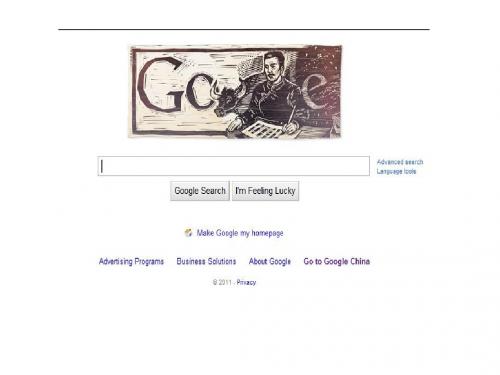
After 1928 he lived mainly in the United States, where his translations of Chinese texts remained popular for many years.
At the behest of Pearl Buck(赛珍珠), he wrote My Country and My People (吾国与吾民) (1935) and The Importance of Living (生活的艺术) (1937), written in English in a charming and witty style, which became bestsellers. Others include Between Tears and Laughter (啼 笑皆非) (1943), The Importance of Understanding (1960, a book of translated Chinese literary passages and short pieces), The Chinese Theory of Art (1967), and the novels Moment in Peking (京华烟云) (1939) and The Vermillion Gate (朱门) (1953).
“纵令这尘世是一个黑暗的地牢,但我们总 得尽力使生活美满。” 他如是说。
他,
就是
林语堂
Brief Introduction
Lin Yutang (October 10, 1895 – March 26, 1976) was a Chinese writer and inventor. His informal but polished style in both Chinese and English made him one of the most influential writers of his generation, and his compilations and translations of classic Chinese texts into English were bestsellers in the West.
林语堂翻译
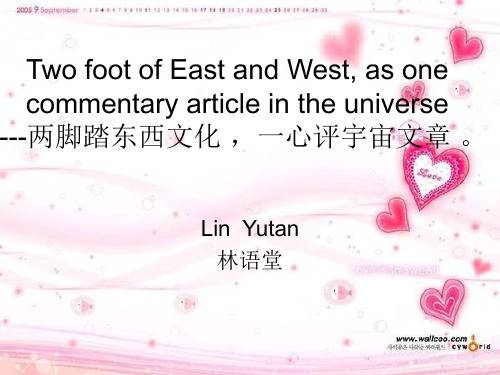
Translation practice
●Lin is not only concerned about the theory of translation studies, but also actively engaged in translation practice. Lin translates few foreign literary works, but he translates a great number of Chinese works to English .He translate and edit a wealth of works of classical Chinese philosophy, such as “The Art of Living” ,“the wisdom of Confucius” and so on. ●林语堂不仅仅关注翻译理论的探讨研究 ,而且积 极地投入翻译实践 。林氏很少译介国文学作品 , 可中译英的数量却可观。他编译过包含了丰富的 中国古典哲学思想的作品 ,如《生活的艺术》, 《孔子的智慧》 等 。
Example
• 辛弃疾 《丑奴儿 ·书博山道中壁》: “少年不知 愁滋味 ,爱上层楼。 爱上层楼 ,为赋新词强说 愁。 而今识尽愁滋味 ,欲说还休 。 欲说还休 , 却道天凉好个秋 。 ” • 林语堂先生译为 : In my younger days, I had tasted only gladness, But loved to mount the top floor, But loved to mount the top floor, To write a song pretending sadness. And now I ‘ve tasted Sorrow s flavors, bitter and sour, And can ’t find a word, And can’ t find a word, But merely say, “What a golden autumn hour! ”
林语堂与文学翻译
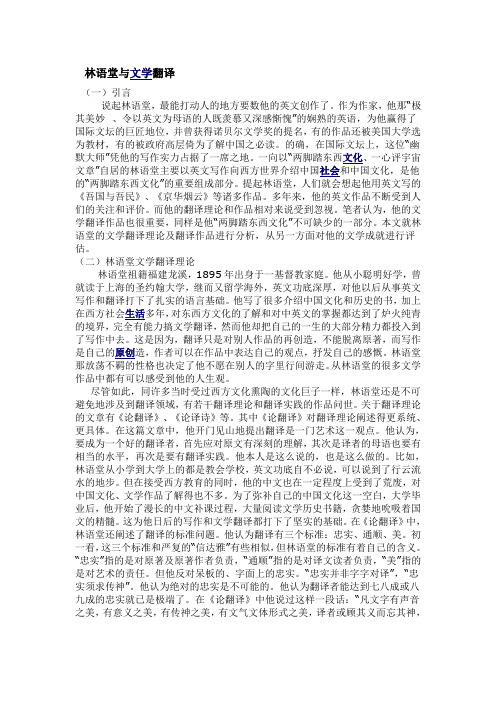
林语堂与文学翻译(一)引言说起林语堂,最能打动人的地方要数他的英文创作了。
作为作家,他那“极其美妙、令以英文为母语的人既羡慕又深感惭愧”的娴熟的英语,为他赢得了国际文坛的巨匠地位,并曾获得诺贝尔文学奖的提名,有的作品还被美国大学选为教材,有的被政府高层倚为了解中国之必读。
的确,在国际文坛上,这位“幽默大师”凭他的写作实力占据了一席之地。
一向以“两脚踏东西文化、一心评宇宙文章”自居的林语堂主要以英文写作向西方世界介绍中国社会和中国文化,是他的“两脚踏东西文化”的重要组成部分。
提起林语堂,人们就会想起他用英文写的《吾国与吾民》、《京华烟云》等诸多作品。
多年来,他的英文作品不断受到人们的关注和评价。
而他的翻译理论和作品相对来说受到忽视。
笔者认为,他的文学翻译作品也很重要,同样是他“两脚踏东西文化”不可缺少的一部分。
本文就林语堂的文学翻译理论及翻译作品进行分析,从另一方面对他的文学成就进行评估。
(二)林语堂文学翻译理论林语堂祖籍福建龙溪,1895年出身于一基督教家庭。
他从小聪明好学,曾就读于上海的圣约翰大学,继而又留学海外,英文功底深厚,对他以后从事英文写作和翻译打下了扎实的语言基础。
他写了很多介绍中国文化和历史的书,加上在西方社会生活多年,对东西方文化的了解和对中英文的掌握都达到了炉火纯青的境界,完全有能力搞文学翻译,然而他却把自己的一生的大部分精力都投入到了写作中去。
这是因为,翻译只是对别人作品的再创造,不能脱离原著,而写作是自己的原创造,作者可以在作品中表达自己的观点,抒发自己的感慨。
林语堂那放荡不羁的性格也决定了他不愿在别人的字里行间游走。
从林语堂的很多文学作品中都有可以感受到他的人生观。
尽管如此,同许多当时受过西方文化熏陶的文化巨子一样,林语堂还是不可避免地涉及到翻译领域,有若干翻译理论和翻译实践的作品问世。
关于翻译理论的文章有《论翻译》、《论译诗》等。
其中《论翻译》对翻译理论阐述得更系统、更具体。
林语堂等论翻译
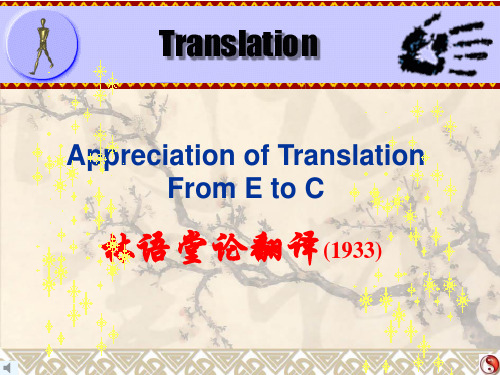
Nor can it be said truly that a pure-blooded Chinese could
ever quite disagree with Chuangtse's ideas. Taoism is not a
school of thought in China, it is a deep, fundamental trait of Chinese thinking, and of the Chinese attitude toward life and toward society. It has depth, while Confucianism has only a practical sense of proportions; it enriches Chinese poetry and
且所译原文,每每属于西洋艺术作品,如诗文小说之
类,译者不译此等书则已,若译此等书则于达用之外,
不可不注意于文字之美的问题。
译艺术文最重要的,就是应以原文之风格与其内容并 重。不但须注意其说的什么,并且须注意怎么说法。 凡译艺术文的人,必先把其所译作者之风度神韵预先
认出,于译时复极力发挥,才是尽译艺术文之义
的翻译理论基本上没有超出严复和林语堂这两位大家所讨论过
的范畴,所异者只是表达方式而已。
Chuangtse,
Mystic and Humorist: Lin Yutang's Introduction
Jesus was followed by St. Paul, Socrates by Plato, Confucius by Mencius, and Laotse by Chuangtse. In all four cases, the first
兰亭集序-林语堂翻译
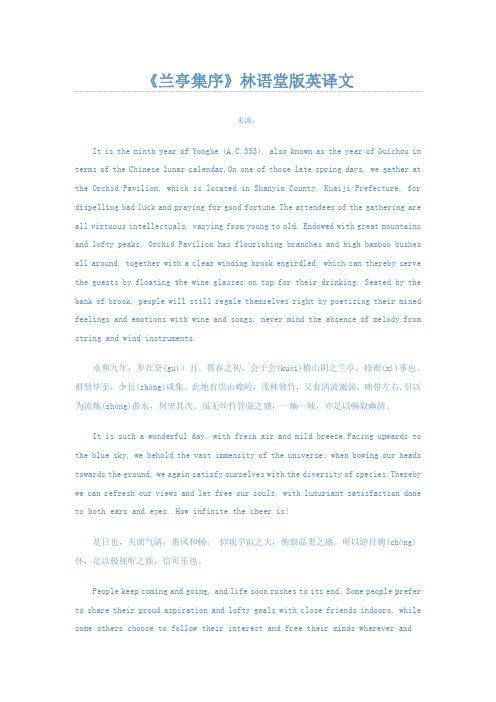
《兰亭集序》林语堂版英译文来源:It is the ninth year of Yonghe (A.C.353), also known as the year of Guichou in terms of the Chinese lunar calendar.On one of those late spring days, we gather at the Orchid Pavilion, which is located in Shanyin County, Kuaiji Prefecture, for dispelling bad luck and praying for good fortune.The attendees of the gathering are all virtuous intellectuals, varying from young to old. Endowed with great mountains and lofty peaks, Orchid Pavilion has flourishing branches and high bamboo bushes all around, together with a clear winding brook engirdled, which can thereby serve the guests by floating the wine glasses on top for their drinking. Seated by the bank of brook, people will still regale themselves right by poetizing their mixed feelings and emotions with wine and songs, never mind the absence of melody from string and wind instruments.永和九年,岁在癸(guǐ)丑。
林语堂哲学翻译与翻译哲学

林语堂哲学翻译与翻译哲学0. 引言林语堂(1895-1976)是中国现代的著名学者、重要作家、翻译家、语言学家与哲学家。
为中外文化的交流与融合做出了不少贡献。
在西方,林语堂不仅仅是学者作家,更多得是被称为哲学家。
林语堂的《吾国与吾民》(My Country and My People)、《生活的艺术》(The Importance of Living)位于畅销书之首位。
他向西方传播了孔孟老庄思想,向西方读者展现了真实的中国哲学与形象。
美国林语堂研究专家Timothy C. Huson在林语堂国际学术研讨会评价林语堂时认为他提倡日常生活哲学,睡觉哲学,饮食哲学,在这些日常哲学中,含有深沉的哲理,他通过讽刺和幽默,来表达他的哲学观点。
其作品没有故意迎合美国人的口味,他是一位很有独立人格的哲学家。
1. 林语堂是哲学家?林语堂一生贡献卓著。
作为作家,著述颇丰。
作为语言学家,他研究了古代方言、探究闽粤方言之来源等,编撰《林语堂当代英汉词典》。
作为发明家,倾尽家财发明出来明快打字机。
作为翻译家,不仅向西方介绍了中国博大精深的文化,还向西方译介了中华哲学的精髓——儒家与道家思想。
因为他的幽默与闲适的生活哲学,他是一位哲学家。
1.1 为何林语堂是哲学家?哲学是是理论化、系统化的世界观,是自然知识、社会知识、思维知识的概括和总结,是世界观和方法论的统一。
所讨论的自然与生命的本质。
哲学家就是对哲学的深入研究思考的人。
纵观其著作,从译著《孔子的智慧》(The Wisdom of Confucius)、《老子的智慧》(The Wisdom of Laotse)到英文小说《京华烟云》(Moment in Peking)、传记《苏东坡传》(The Gay Genius, The Life and Times of Su Tunpo)以及散文集中,体现出综合儒家与道家思想之所长,体现各种生活哲学。
但是这种哲学与传统的儒道思想不同,融合儒道,使两者互补,是儒道的发展与升华。
齐物论英文版——林语堂
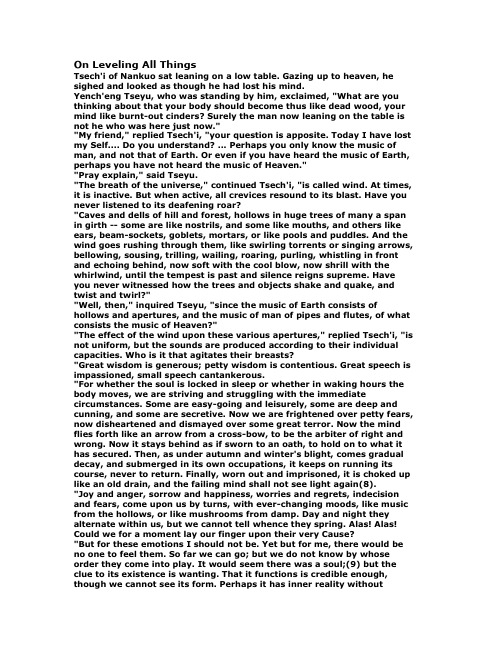
On Leveling All ThingsTsech'i of Nankuo sat leaning on a low table. Gazing up to heaven, he sighed and looked as though he had lost his mind.Yench'eng Tseyu, who was standing by him, exclaimed, "What are you thinking about that your body should become thus like dead wood, your mind like burnt-out cinders? Surely the man now leaning on the table is not he who was here just now.""My friend," replied Tsech'i, "your question is apposite. Today I have lost my Self.... Do you understand? ... Perhaps you only know the music of man, and not that of Earth. Or even if you have heard the music of Earth, perhaps you have not heard the music of Heaven.""Pray explain," said Tseyu."The breath of the universe," continued Tsech'i, "is called wind. At times, it is inactive. But when active, all crevices resound to its blast. Have you never listened to its deafening roar?"Caves and dells of hill and forest, hollows in huge trees of many a span in girth -- some are like nostrils, and some like mouths, and others like ears, beam-sockets, goblets, mortars, or like pools and puddles. And the wind goes rushing through them, like swirling torrents or singing arrows, bellowing, sousing, trilling, wailing, roaring, purling, whistling in front and echoing behind, now soft with the cool blow, now shrill with the whirlwind, until the tempest is past and silence reigns supreme. Have you never witnessed how the trees and objects shake and quake, and twist and twirl?""Well, then," inquired Tseyu, "since the music of Earth consists of hollows and apertures, and the music of man of pipes and flutes, of what consists the music of Heaven?""The effect of the wind upon these various apertures," replied Tsech'i, "is not uniform, but the sounds are produced according to their individual capacities. Who is it that agitates their breasts?"Great wisdom is generous; petty wisdom is contentious. Great speech is impassioned, small speech cantankerous."For whether the soul is locked in sleep or whether in waking hours the body moves, we are striving and struggling with the immediate circumstances. Some are easy-going and leisurely, some are deep and cunning, and some are secretive. Now we are frightened over petty fears, now disheartened and dismayed over some great terror. Now the mind flies forth like an arrow from a cross-bow, to be the arbiter of right and wrong. Now it stays behind as if sworn to an oath, to hold on to what it has secured. Then, as under autumn and winter's blight, comes gradual decay, and submerged in its own occupations, it keeps on running its course, never to return. Finally, worn out and imprisoned, it is choked up like an old drain, and the failing mind shall not see light again(8)."Joy and anger, sorrow and happiness, worries and regrets, indecision and fears, come upon us by turns, with ever-changing moods, like music from the hollows, or like mushrooms from damp. Day and night they alternate within us, but we cannot tell whence they spring. Alas! Alas! Could we for a moment lay our finger upon their very Cause?"But for these emotions I should not be. Yet but for me, there would be no one to feel them. So far we can go; but we do not know by whose order they come into play. It would seem there was a soul;(9) but the clue to its existence is wanting. That it functions is credible enough, though we cannot see its form. Perhaps it has inner reality withoutoutward form."Take the human body with all its hundred bones, nine external cavities and six internal organs, all complete. Which part of it should I love best? Do you not cherish all equally, or have you a preference? Do these organs serve as servants of someone else? Since servants cannot govern themselves, do they serve as master and servants by turn? Surely thereis some soul which controls them all."But whether or not we ascertain what is the true nature of this soul, it matters but little to the soul itself. For once coming into this material shape, it runs its course until it is exhausted. To be harassed by the wear and tear of life, and to be driven along without possibility of arrestingone's course, -- is not this pitiful indeed? To labor without ceasing all life, and then, without living to enjoy the fruit, worn out with labor, to depart, one knows not whither, -- is not this a just cause for grief?""Men say there is no death -- to what avail? The body decomposes, and the mind goes with it. Is this not a great cause for sorrow? Can the world be so dull as not to see this? Or is it I alone who am dull, and others not so?"Now if we are to be guided by our prejudices, who shall be without a guide? What need to make comparisons of right and wrong with others? And if one is to follow one's own judgments according to his prejudices, even the fools have them! But to form judgments of right and wrong without first having a mind at all is like saying, "I left for Yu:eh today, and got there yesterday." Or, it is like assuming something which does not exist to exist. The (illusions of) assuming something which does not exist to exist could not be fathomed even by the divine Yu:; how much less could we?For speech is not mere blowing of breath. It is intended to say some thing, only what it is intended to say cannot yet be determined. Is there speech indeed, or is there not? Can we, or can we not, distinguish it from the chirping of young birds?How can Tao be obscured so that there should be a distinction of trueand false? How can speech be so obscured that there should be a distinction of right and wrong?(10) Where can you go and find Tao not to exist? Where can you go and find that words cannot be proved? Tao is obscured by our inadequate understanding, and words are obscured by flowery expressions. Hence the affirmations and denials of the Confucian and Motsean(11) schools, each denying what the other affirms and affirming what the other denies. Each denying what the other affirms and affirming what the other denies brings us only into confusion.There is nothing which is not this; there is nothing which is not that. What cannot be seen by what (the other person) can be known by myself. Hence I say, this emanates from that; that also derives from this. This is the theory of the interdependence of this and that (relativity of standards).Nevertheless, life arises from death, and vice versa. Possibility arises from impossibility, and vice versa. Affirmation is based upon denial, and vice versa. Which being the case, the true sage rejects all distinctionsand takes his refuge in Heaven (Nature). For one may base it on this, yet this is also that and that is also this. This also has its 'right' and 'wrong', and that also has its 'right' and 'wrong.' Does then the distinction between this and that really exist or not? When this (subjective) and that (objective) are both without their correlates, that is the very 'Axis ofTao.' And when that Axis passes through the center at which all Infinities converge, affirmations and denials alike blend into the infinite One. Hence it is said that there is nothing like using the Light.To take a finger in illustration of a finger not being a finger is not so good as to take something which is not a finger to illustrate that a finger is not a finger. To take a horse in illustration of a horse not being a horse is not so good as to take something which is not a horse to illustrate that a horse is not a horse(12). So with the universe which is but a finger, but a horse. The possible is possible: the impossible is impossible. Tao operates, and the given results follow; things receive names and are said to be what they are. Why are they so? They are said to be so! Why are they not so? They are said to be not so! Things are so by themselves and have possibilities by themselves. There is nothing which is not so and there is nothing which may not become so.Therefore take, for instance, a twig and a pillar, or the ugly person and the great beauty, and all the strange and monstrous transformations. These are all leveled together by Tao. Division is the same as creation; creation is the same as destruction. There is no such thing as creation or destruction, for these conditions are again leveled together into One. Only the truly intelligent understand this principle of the leveling of all things into One. They discard the distinctions and take refuge in the common and ordinary things. The common and ordinary things serve certain functions and therefore retain the wholeness of nature. From this wholeness, one comprehends, and from comprehension, one to the Tao. There it stops. To stop without knowing how it stops -- this is Tao.But to wear out one's intellect in an obstinate adherence to the individuality of things, not recognizing the fact that all things are One, -- that is called "Three in the Morning." What is "Three in the Morning?" A keeper of monkeys said with regard to their rations of nuts that each monkey was to have three in the morning and four at night. At this the monkeys were very angry. Then the keeper said they might have four in the morning and three at night, with which arrangement they were all well pleased. The actual number of nuts remained the same, but there was a difference owing to (subjective evaluations of) likes and dislikes.It also derives from this (principle of subjectivity). Wherefore the true Sage brings all the contraries together and rests in the natural Balance of Heaven. This is called (the principle of following) two courses (at once). The knowledge of the men of old had a limit. When was the limit? It extended back to a period when matter did not exist. That was the extreme point to which their knowledge reached. The second period was that of matter, but of matter unconditioned (undefined). The third epoch saw matter conditioned (defined), but judgments of true and false were still unknown. When these appeared, Tao began to decline. And with the decline of Tao, individual bias (subjectivity) arose.Besides, did Tao really rise and decline?(13) In the world of (apparent) rise and decline, the famous musician Chao Wen did play the string instrument; but in respect to the world without rise and decline, Chao Wen did not play the string instrument. When Chao Wen stopped playing the string instrument, Shih K'uang (the music master) laid down hisdrum-stick (for keeping time), and Hueitse (the sophist) stopped arguing, they all understood the approach of Tao. These people are the best in their arts, and therefore known to posterity. They each loved his art, and wanted to excel in his own line. And because they loved their arts, theywanted to make them known to others. But they were trying to teach what (in its nature) could not be known. Consequently Hueitse ended in the obscure discussions of the "hard" and "white"; and Chao Wen's son tried to learn to play the stringed instrument all his life and failed. If this may be called success, then I, too, have succeeded. But if neither of them could be said to have succeeded, then neither I nor others have succeeded. Therefore the true Sage discards the light that dazzles and takes refuge in the common and ordinary. Through this comes understanding.Suppose here is a statement. We do not know whether it belongs to one category or another. But if we put the different categories in one, then the differences of category cease to exist. However, I must explain. If there was a beginning, then there was a time before that beginning, and a time before the time which was before the time of that beginning. If there is existence, there must have been non-existence. And if there was a time when nothing existed, then there must have been a time when even nothing did not exist. All of a sudden, nothing came into existence. Could one then really say whether it belongs to the category of existence or of non-existence? Even the very words I have just now uttered, -- I cannot say whether they say something or not.There is nothing under the canopy of heaven greater than the tip of abird's down in autumn, while the T'ai Mountain is small. Neither is there any longer life than that of a child cut off in infancy, while P'eng Tsu himself died young. The universe and I came into being together; I and everything therein are One.If then all things are One, what room is there for speech? On the other hand, since I can say the word 'one' how can speech not exist? If it does exist, we have One and speech -- two; and two and one -- three(14) from which point onwards even the best mathematicians will fail to reach (the ultimate); how much more then should ordinary people fail?Hence, if from nothing you can proceed to something, and subsequently reach there, it follows that it would be still easier if you were to start from something. Since you cannot proceed, stop here. Now Tao by its very nature can never be defined. Speech by its very nature cannot express the absolute. Hence arise the distinctions. Such distinctions are: "right" and "left," "relationship" and "duty," "division" and "discrimination, "emulation and contention. These are called the Eight Predicables.Beyond the limits of the external world, the Sage knows that it exists,but does not talk about it. Within the limits of the external world, the Sage talks but does not make comments. With regard to the wisdom of the ancients, as embodied in the canon of Spring and Autumn, the Sage comments, but does not expound. And thus, among distinctions made, there are distinctions that cannot be made; among things expounded, there are things that cannot be expounded.How can that be? it is asked. The true Sage keeps his knowledge within him, while men in general set forth theirs in argument, in order to convince each other. And therefore it is said that one who argues does so because he cannot see certain points.Now perfect Tao cannot be given a name. A perfect argument does not employ words. Perfect kindness does not concern itself with (individual acts of) kindness(15). Perfect integrity is not critical of others(16). Perfect courage does not push itself forward.For the Tao which is manifest is not Tao. Speech which argues falls short of its aim. Kindness which has fixed objects loses its scope. Integrity which is obvious is not believed in. Courage which pushes itself forward never accomplishes anything. These five are, as it were, round (mellow) with a strong bias towards squareness (sharpness). Therefore that knowledge which stops at what it does not know, is the highest knowledge.Who knows the argument which can be argued without words, and the Tao which does not declare itself as Tao? He who knows this may be said to enter the realm of the spirit (17). To be poured into without becoming full, and pour out without becoming empty, without knowing how this is brought about, -- this is the art of "Concealing the Light."Of old, the Emperor Yao said to Shun, "I would smite the Tsungs, and the Kueis, and the Hsu:-aos. Since I have been on the throne, this has ever been on my mind. What do you think?""These three States," replied Shun, "lie in wild undeveloped regions. Why can you not shake off this idea? Once upon a time, ten suns came out together, and all things were illuminated thereby. How much greater should be the power of virtue which excels the suns?"Yeh Ch'u:eh asked Wang Yi, saying, "Do you know for certain that all things are the same?""How can I know?" answered Wang Yi. "Do you know what you do not know?""How can I know!" replied Yeh Ch'u:eh. "But then does nobody know?" "How can I know?" said Wang Yi. "Nevertheless, I will try to tell you. How can it be known that what I call knowing is not really not knowing and that what I call not knowing is not really knowing? Now I would ask you this, If a man sleeps in a damp place, he gets lumbago and dies. But how about an eel? And living up in a tree is precarious and trying to the nerves. But how about monkeys? Of the man, the eel, and the monkey, whose habitat is the right one, absolutely? Human beings feed on flesh, deer on grass, centipedes on little snakes, owls and crows on mice. Of these four, whose is the right taste, absolutely? Monkey mates with the dog-headed female ape, the buck with the doe, eels consort with fishes, while men admire Mao Ch'iang and Li Chi, at the sight of whom fishes plunge deep down in the water, birds soar high in the air, and deer hurry away. Yet who shall say which is the correct standard of beauty? In my opinion, the doctrines of humanity and justice and the paths of right and wrong are so confused that it is impossible to know their contentions." "If you then," asked Yeh Ch'u:eh, "do not know what is good and bad, is the Perfect Man equally without this knowledge?""The Perfect Man," answered Wang Yi, "is a spiritual being. Were the ocean itself scorched up, he would not feel hot. Were the great rivers frozen hard, he would not feel cold. Were the mountains to be cleft by thunder, and the great deep to be thrown up by storm, he would not tremble with fear. Thus, he would mount upon the clouds of heaven, and driving the sun and the moon before him, pass beyond the limits of this mundane existence. Death and life have no more victory over him. How much less should he concern himself with the distinctions of profit and loss?"Chu: Ch'iao addressed Ch'ang Wutse as follows: "I heard Confucius say, 'The true Sage pays no heed to worldly affairs. He neither seeks gain nor avoids injury. He asks nothing at the hands of man and does not adhereto rigid rules of conduct. Sometimes he says something without speaking and sometimes he speaks without saying anything. And so he roams beyond the limits of this mundane world.'These,' commented Confucius, 'are futile fantasies.' But to me they are the embodiment of the most wonderful Tao. What is your opinion?" "These are things that perplexed even the Yellow Emperor," repliedCh'ang Wutse. "How should Confucius know? You are going too far ahead. When you see a hen's egg, you already expect to hear a cock crow.When you see a sling, you are already expected to have broiled pigeon. I will say a few words to you at random, and do you listen at random. "How does the Sage seat himself by the sun and moon, and hold the universe in his grasp? He blends everything into one harmonious whole, rejecting the confusion of this and that. Rank and precedence, which the vulgar sedulously cultivate, the Sage stolidly ignores, amalgamating the disparities of ten thousand years into one pure mold. The universe itself, too, conserves and blends all in the same manner."How do I know that love of life is not a delusion after all? How do Iknow but that he who dreads death is not as a child who has lost his way and does not know his way home?"The Lady Li Chi was the daughter of the frontier officer of Ai. When the Duke of Chin first got her, she wept until the bosom of her dress was drenched with tears. But when she came to the royal residence, shared with the Duke his luxurious couch, and ate rich food, she repented of having wept. How then do I know but that the dead may repent of having previously clung to life?"Those who dream of the banquet, wake to lamentation and sorrow. Those who dream of lamentation and sorrow wake to join the hunt.While they dream, they do not know that they are dreaming. Some will even interpret the very dream they are dreaming; and only when they awake do they know it was a dream. By and by comes the great awakening, and then we find out that this life is really a great dream. Fools think they are awake now, and flatter themselves they know -- this one is a prince, and that one is a shepherd. What narrowness of mind! Confucius and you are both dreams; and I who say you are dreams -- I am but a dream myself. This is a paradox. Tomorrow a Sage may arise to explain it; but that tomorrow will not be until ten thousand generations have gone by. Yet you may meet him around the corner."Granting that you and I argue. If you get the better of me, and not I of you, are you necessarily right and I wrong? Or if I get the better of you and not you of me, am I necessarily right and you wrong? Or are we both partly right and partly wrong? Or are we both wholly right and wholly wrong? You and I cannot know this, and consequently we all live in darkness."Whom shall I ask as arbiter between us? If I ask someone who takes your view, he will side with you. How can such a one arbitrate between us? If I ask someone who takes my view, he will side with me. How can such a one arbitrate between us? If I ask someone who differs from both of us, he will be equally unable to decide between us, since he differs from both of us. And if I ask someone who agrees with both of us, he will be equally unable to decide between us, since he agrees with both of us. Since then you and I and other men cannot decide, how can we depend upon another? The words of arguments are all relative; if we wish to reach the absolute, we must harmonize them by means of the unity ofGod, and follow their natural evolution, so that we may complete our allotted span of life."But what is it to harmonize them by means of the unity of God? It is this. The right may not be really right. What appears so may not be really so. Even if what is right is really right, wherein it differs from wrong cannot be made plain by argument. Even if what appears so is really so, wherein it differs from what is not so also cannot be made plain by argument. "Take no heed of time nor of right and wrong. Passing into the realm of the Infinite, take your final rest therein."The Penumbra said to the Umbra, "At one moment you move: at another you are at rest. At one moment you sit down: at another you get up. Why this instability of purpose?""Perhaps I depend," replied the Umbra, "upon something which causes me to do as I do; and perhaps that something depends in turn upon something else which causes it to do as it does. Or perhaps my dependence is like (the unconscious movements) of a snake's scales orof a cicada's wings. How can I tell why I do one thing, or why I do not do another?"Once upon a time, I, Chuang Chou (18), dreamt I was a butterfly, fluttering hither and thither, to all intents and purposes a butterfly. I was conscious only of my happiness as a butterfly, unaware that I was Chou. Soon I awaked, and there I was, veritably myself again. Now I do not know whether I was then a man dreaming I was a butterfly, or whether I am now a butterfly, dreaming I am a man. Between a man and abutterfly there is necessarily a distinction. The transition is called the transformation of material。
- 1、下载文档前请自行甄别文档内容的完整性,平台不提供额外的编辑、内容补充、找答案等附加服务。
- 2、"仅部分预览"的文档,不可在线预览部分如存在完整性等问题,可反馈申请退款(可完整预览的文档不适用该条件!)。
- 3、如文档侵犯您的权益,请联系客服反馈,我们会尽快为您处理(人工客服工作时间:9:00-18:30)。
7
A
关于作品文本的选择
林语堂“明智地选择自己民族所特有的东 《孔子西的”智,慧不》遗和余《老力子地的翻智译慧中》国反文映中化国的的优古秀典代哲学的 论著;表作品。所以,因此,林语堂的大部分翻 《京华译烟文云本》和、英《文风声创鹤作唳的》选等择能都综是合折以射中出国中的国历历史文 化《和吾哲国史学与文的吾化小民为说》背;、景《生活的艺术》、《苏东坡传》等反映
3
A
译著
《冥寥子游》 《不亦快哉》 《东坡诗文选》 《幽梦影》 《板桥家书》 《老子的智慧》 《浮生六记》
4
A
林语堂英译《浮生六记》
《浮生六记》是清朝沈复的自传体散文。 《浮生六记》以作者夫妇生活为主线,赢 余了平凡而又充满情趣的居家生活的浪游 各地的所见所闻。作品描述了作者和妻子 陈芸情投意合,想要过一种布衣蔬食而从 事艺术的生活,由于封建礼教的压迫与贫 困生活的煎熬,终至理想破灭。
林语堂及其翻译思想
1
A
1.作者及作品介绍
林语堂(1895-1976),中国现代著名 学者、文学家、语言学家。福建龙溪人 ,出生于福建省漳州市平和县坂仔镇贫 穷的牧师家庭。原名和乐,后改玉堂, 又改语堂。早年留学国外,回国后在北 京大学、厦门大学等著名大学任教, 1966年定居台湾,1976年在香港逝世, 享年八十二岁。林语堂既有扎实的中国 古典文学功底,又有很高的英文造诣, 他一生笔耕不辍,著作等身。林语堂于 1940年、1950年和1975年三度获得诺贝 尔文学奖的提名。
中国人生活观念和态度的作品; 《浮生六记》情操陶冶的生活翻译作品
8
A
3.翻译思想
《论翻译》 “谈翻译的人首先要觉悟的事件,就是翻
译是一种的艺术。” 中国翻译史上认为“翻译是一门艺术”学
派的代表人物
9
A
对译者的要求
第一是译者对于原文文字上以及内容上透 彻的了解;
第二是译者有相当的国文程度,能写清顺 畅达的中文;
the forest, and the breeze was playing about our
sleeves, while the moon' s image sparkled in the rippling
water, and all worldly cares were banished from our
杨翠柏”为珍贵盆景,在中国传统文化中主要供文
12
A
4.翻译作品赏析
林先生对原著者的忠实首先表现在他强调 “传神”,他认为“译者不但须求达意,并 且须以传神为目的。译文须忠实于原文之 字神句气和言外之意”。
13
A
“少焉一轮明月已上林梢,渐觉风生袖底,月到波心,俗虑尘怀爽然顿释。”
After a while, the moon had already arisen from behind
第三是译事上的训练,译者对于翻译标准 及手术的问题有正当的见解。
10
A
翻译标准之三方 面
第一是忠实标准 第二是通顺标准 第三是美的标准
译者对原文方面的问题 译者对中文方面的问题 是翻译与艺术文的问题
论忠实标准——译者第一的责任,就是 对原文或原著者的责任,换言之,就是 如何才可以忠实于原文,不负著者的才 思与用意。 “忠实标准”的四义:非字译、须传神 、非绝对、须通顺。
5
A
2.翻译目的
“五四”文化运动前后,林语堂开始了他 的文学翻译活动
林语堂以学贯中西的底蕴,凭借对东西方 文化的熟谙以及其对中英两种语言炉火纯 青的掌握,翻译了大量的中国优秀作品, 为西方人客观地打开了了解中国一扇窗口 。
6
A
“两脚踏东西文化,一心评宇宙文章”
“向中国人讲外国文化,向外国人讲中国文化” 。
14
A
保留原语文化
余曰:“卿果中道相舍,断无再续之理,况‘曾 经沧海难为水,除却巫山不是云’耳。” (沈复《浮生六记》)
“Even if you should leave me half-way like this” I
said, “I shall never marry again. Besides, ‘It is difficult to be water for one who has seen the great seas and difficult to be clouds for one who
breasts. 句中“风生袖底,月到波心”,但林先生凭借其深厚的语 言功底,选了“play about”和“sparkle”生动地体现 原文的“字神”,特别是“play about”采用拟人的手 法,不仅惟妙惟肖地再现了“风生袖底”,而且还暗示了 人物轻松愉快的心情。从上可以看出林先生虽然反对“ 字译”,但他为了忠实于原著者并不反对对于单字的锤 炼
2
A
英文译作
《京华烟云》Moment in Peking 《风声鹤唳》A Leaf in the Storm 《朱门》The Vermillion Gate 《啼笑皆非》Between Tears and Laughter 《吾国与吾民》My Country and My People
《逃向自由城》 《红牡丹》
has seen the Yangtze Gorges.”
15
A
林语堂先生以直译的手法翻译此句,虽未 做任何解释,但英语读者仍能通过字里行 间丰富的意象领略到其中中国文化的内涵 ,取得足够的语境效果。此译既保全了原 文的意象又留存了含蓄蕴藉的艺术魅力, 可谓形意神俱全。
16
A
符合译语文化
又在“扬明珠州暗商投家”见出有自虞《鲁山仲游连客邹携阳送列黄传》杨,翠后柏用各于一比盆, 惜乎喻明贵重珠的暗东投西。落(入沈不识复货《的浮人生手六里记。原》文)中的“黄
通顺作为第二条标准,同时也是忠实的第 四层含义,即忠实非说不通中国话之谓。 第一,须以句为本位;第二,须完全根据 中文心理。
而关于“美的标准”,他认为翻译于用
之外,还有工作当作一种艺术。
11
A
“以译者所负的责任言,第一是译者对原著 者的责任,第二是译者对中国读者的责任 ,第三是译者对艺术的责任。三样的责任 心备,然后可以谓具有真正译家的资格。 ”
